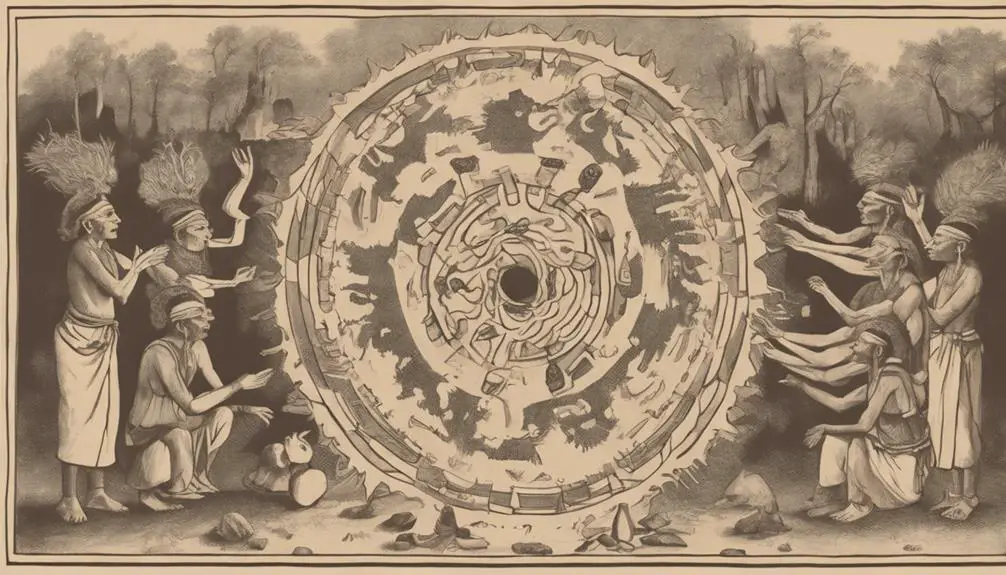Origins of Hypnosis Timeline
Why Has Hypnosis Been Culturally Significant Historically?
January 4, 2021 - Origins of Hypnosis Timeline
Hypnosis has been culturally significant historically due to its ancient origins, influence on religious practices, healing traditions, portrayal in entertainment, and impact on modern psychology. Originating from Franz Mesmer's animal magnetism theory, it evolved in ancient civilizations, aiding in spiritual rituals and healing. Hypnosis deepened spiritual experiences and was embraced in therapy for its healing properties. Its depiction in modern media and integration into psychology have further solidified its cultural relevance. Each aspect contributes to the rich tapestry of hypnosis's historical significance, showcasing its enduring impact across diverse cultural landscapes.
Early Roots of Hypnosis

Exploring the historical origins of hypnosis reveals a complex tapestry of ancient practices and beliefs intertwined with modern understandings of the mind-body connection.
The roots of hypnosis can be traced back to the late 18th century with Franz Mesmer, an Austrian physician who developed a theory known as animal magnetism. Mesmer believed that there was an invisible magnetic fluid in the body that could be manipulated to induce healing. This concept led to the practice of mesmerism, where Mesmer used techniques such as passes of the hands and magnets to induce a trance-like state in his patients.
Mesmer's techniques involved creating a sense of mystique and authority, often using dim lighting, dramatic gestures, and soothing music to enhance the hypnotic experience. He would then guide his patients into a state of deep relaxation and suggestibility, allowing him to treat various physical and psychological ailments.
Mesmer's work laid the foundation for modern hypnosis techniques, emphasizing the power of suggestion and the importance of the hypnotist's demeanor in influencing the subject's response.
Hypnosis in Ancient Civilizations
The practice of hypnosis has roots that extend beyond modern history, with evidence suggesting its presence in various ancient civilizations. Mesmer's legacy, often associated with the 18th-century development of hypnosis, has connections to ancient practices.
In ancient Egypt, for example, priests used hypnotic rituals in healing ceremonies, inducing trance-like states in individuals seeking relief from physical and mental ailments. These rituals involved repetitive chanting, music, and focused attention, elements that are commonly seen in modern hypnotic techniques.
Similarly, ancient Greek temples incorporated hypnotic practices as part of their therapeutic methods. Patients seeking healing would engage in rituals that involved relaxation, visualization, and suggestion, all aimed at addressing their ailments through altered states of consciousness.
The use of hypnotic techniques in these ancient civilizations highlights the enduring nature of hypnosis as a tool for healing and transformation, showing its presence throughout human history in various cultural contexts.
Influence on Religious Practices

With its deep historical roots, hypnosis has exerted a significant influence on various religious practices throughout different cultures and time periods. Spiritual connections and ritualistic ceremonies often incorporate elements of altered states of consciousness induced through hypnosis. In many religious traditions, hypnosis has been used as a tool to deepen spiritual experiences and establish a stronger connection to the divine.
Ritualistic ceremonies, such as those found in ancient Egyptian, Greek, and Hindu practices, frequently involved trance-like states induced through rhythmic chanting, dancing, or meditation techniques resembling hypnotic processes. These altered states were believed to allow for greater receptivity to spiritual guidance and divine intervention.
Hypnotic techniques have also been utilized in religious settings to facilitate healing, foster introspection, and enhance prayer experiences. The ability of hypnosis to alter perceptions and consciousness has made it a valuable tool in religious contexts for centuries, contributing to the rich tapestry of spiritual practices worldwide.
Hypnosis in Healing Traditions
Hypnosis plays a significant role in various healing traditions across cultures, offering a unique approach to addressing physical, emotional, and psychological ailments. In healing practices, hypnosis is used to tap into the subconscious mind, enabling individuals to access deep-seated emotions or memories that may be contributing to their health issues. Through this process, individuals can experience profound healing benefits by releasing emotional blockages, reducing stress, and promoting overall well-being.
One key aspect of hypnosis in healing traditions is its ability to establish a spiritual connection. Many healing modalities view illness as stemming from a spiritual imbalance or unresolved spiritual issues. Hypnosis can help individuals connect with their inner selves, higher consciousness, or spiritual guides to facilitate healing on a spiritual level. This spiritual connection can lead to a profound sense of peace, clarity, and empowerment, which are essential components of the healing process in many traditions worldwide.
Evolution in Entertainment and Media

Across the decades, the evolution of entertainment and media has significantly impacted the portrayal and utilization of hypnosis in popular culture. Hypnosis has long been a fascinating subject in pop culture, often portrayed in movies, television shows, and books. From the mysterious hypnotists of early cinema to modern-day psychological thrillers, hypnosis has been a recurring theme in various forms of entertainment.
Mass media, including television and the internet, has played a pivotal role in shaping how hypnosis is perceived by the general public. Shows like 'Hypnotize Me' and 'The Mentalist' have brought hypnosis into living rooms across the globe, showcasing both its entertainment value and potential therapeutic applications.
Additionally, social media platforms have allowed for the dissemination of hypnosis-related content, further cementing its presence in popular culture.
As entertainment continues to evolve, so too will the portrayal of hypnosis in media. Whether used for comedic effect or as a plot device in a suspenseful thriller, hypnosis remains a captivating element in modern storytelling.
Impact on Modern Psychology
The increased visibility and portrayal of hypnosis in popular culture have sparked a growing interest in its applications and effects within the field of modern psychology. Hypnosis is now recognized for its therapeutic benefits and has found various clinical applications. In modern psychology, researchers are delving into the cognitive processes involved in hypnosis and exploring its impact on subconscious influence.
Studies have shown that hypnosis can be effective in treating various psychological conditions, such as anxiety, phobias, and post-traumatic stress disorder. Its ability to tap into the subconscious mind has opened new avenues for therapy and self-exploration. By inducing a trance-like state, hypnosis allows therapists to access and work with the deeper layers of a person's psyche, facilitating healing and personal growth.
Moreover, the integration of hypnosis into cognitive-behavioral therapy has shown promising results in addressing a wide range of mental health issues. The synergy between hypnosis and traditional therapeutic approaches highlights the potential for enhanced treatment outcomes in modern psychology.
Frequently Asked Questions
Can Anyone Be Hypnotized, or Are Some People Immune?
Individual differences exist in susceptibility to hypnosis. While most people can be hypnotized to some extent, factors such as suggestibility and resistance play a role. Some individuals may be more resistant, but with skilled practitioners, many can achieve a hypnotic state.
Is Self-Hypnosis as Effective as Being Hypnotized by a Professional?
Self-hypnosis can be as effective as professional hypnosis, offering personal empowerment and self-improvement. By tapping into the mind-body connection and utilizing relaxation techniques, individuals can achieve desired outcomes independently with practice and dedication.
Are There Any Dangers or Side Effects Associated With Hypnosis?
In hypnosis, ethical considerations are paramount, with potential risks including false memories and emotional distress from unresolved issues. Misconceptions abound, but clinically, hypnosis shows promise in pain management, habit control, and phobia treatment, offering therapeutic benefits.
How Long Does the Effect of Hypnosis Typically Last?
The duration of hypnosis effects varies. Short-term effects can last from minutes to hours after a session, while long-term effects may persist for weeks or longer with reinforcement. Effectiveness over time depends on individual responsiveness and reinforcement.
Can Hypnosis Really Help With Overcoming Phobias and Addictions?
Hypnosis has shown clinical effectiveness in aiding individuals with phobias and addictions. Scientific evidence supports its benefits as an alternative therapy, offering a holistic approach to addressing underlying issues. Further research continues to explore its applications.
Conclusion
In conclusion, hypnosis has played a significant role in various cultures throughout history, influencing religious practices, healing traditions, entertainment, and modern psychology.
Its early roots can be traced back to ancient civilizations, showcasing its enduring cultural significance.
The evolution of hypnosis has had a profound impact on society, shaping beliefs and practices that continue to be relevant in the modern world.
